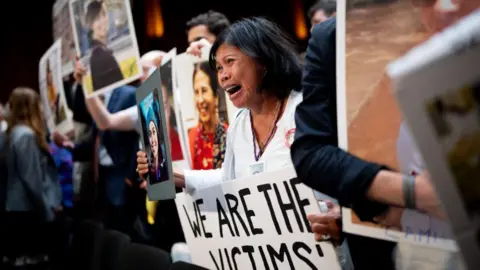Boeing plea deal over fatal Max crashes rejected
 Getty Images
Getty ImagesA Boeing plea deal intended to resolve a case related to two fatal crashes of its planes has been rejected by a US judge.
The plane maker agreed with the US government in July to plead guilty to one count of criminal fraud, face independent monitoring and pay a $243m (£191m) fine.
However, Judge Reed O'Connor struck down the agreement on Thursday, saying it undermined the court and that diversity requirements for hiring the monitor were "contradictory".
Family members of the 346 people killed in the crashes welcomed the ruling, describing the plea deal as a "get-out-of-jail-free card for Boeing".
The Department of Justice said it was reviewing the decision. Boeing did not immediately comment.
In his decision, Judge O'Connor said the government's previous years of overseeing the firm had "failed".
"At this point, the public interest requires the court to step in," he wrote.
He said the proposed agreement did not require Boeing to comply with the monitor's recommendations and gave the company a say in selecting a candidate.
Those issues had also been raised by some families of those killed on the flights, who had criticised it as a "sweetheart" arrangement that did not properly hold the firm to account for the deaths.
Judge O'Connor also focused on the deal's requirements that race be considered when hiring the monitor, which he said would undermine confidence in the person hired.
"In a case of this magnitude, it is in the utmost interest of justice that the public is confident this monitor selection is done based solely on competency," he wrote.
"The parties' DEI [diversity, equity and inclusion] efforts only serve to undermine this confidence in the government and Boeing's ethics and anti-fraud efforts."
Ike and Susan Riffel of California, who lost their two sons, Melvin and Bennett, said the judge had done "the right thing" in rejecting the proposed agreement.
"This deal didn't hold anyone accountable for the deaths of 346 people and did nothing to protect the flying public," they said in a statement supplied by their lawyer.
They said they hoped the ruling would pave the way for "real justice".
An ongoing crisis
Boeing and the Department of Justice have 30 days to develop a new plan in response to the ruling.
The plane maker has been struggling to emerge from the shadow cast by two, near-identical crashes of its 737 Max planes in 2018 and 2019.
The aerospace giant faced fresh crisis in January when a door panel on a new Boeing plane operated by Alaska Airlines blew out soon after take-off.
The incident reignited questions about what Boeing had done to improve its safety and quality record since the accidents, which were tied to the company's flight control system.
The door panel malfunction happened shortly before the end of a three-year period of increased monitoring and reporting.
Boeing had agreed to the monitoring as part of a 2021 plea deal to resolve a charge it had deceived regulators over the flight control system.
In May, the Department of Justice said Boeing had violated the terms of that agreement, opening up the possibility of prosecution.
Instead, the two sides struck another deal, angering families who had hoped to see the company brought to trial.
In the ruling, Judge O'Connor wrote it was "not clear what all" Boeing had done to breach the 2021 agreement.
Nonetheless, he wrote, "taken as true that Boeing breached the [deal], it is fair to say that the government's attempt to ensure compliance has failed".
Erin Appelbaum, partner at Kreindler & Kreindler, which represents some families of those killed on the 2019 Ethiopian Airlines Flight 302, called Thursday's ruling an "excellent decision and a significant victory" for the victims' families.
"We anticipate a significant renegotiation of the plea deal that incorporates terms truly commensurate with the gravity of Boeing's crimes," she said.
"It's time for the [Department of Justice] to end its lenient treatment of Boeing and demand real accountability."
